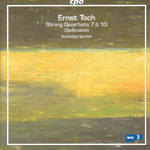Ernst Toch’s String Quartet No. 7, composed in 1907, is one of his earliest surviving works. As with the Sixth Quartet, the Seventh bears the clear influence of Brahms, most certainly in the first movement’s motivic construction and intricate part-writing. But No. 7 also is imbued with a Dvorákian big-hearted, outgoing spirit, most strongly registered in the faster movements, while the tender adagio beguiles with its idyllic main theme. This same lilting lyricism informs Dedication, a miniature string quartet that Toch composed in 1948. The cloying melody is unabashedly romantic, even though by this time Toch’s overall style had become harsher and tonally astringent.
The 1923 Tenth Quartet is sort of a bridge between the two extremes. The lushly appointed sonorities of his early work are still in evidence, but by now Toch’s harmonies were beginning to stretch beyond the boundaries of tonality. Yet the music remains all the more beautiful because of these new flavorings, which spike the nervously energetic first movement. However, the centerpiece of this quartet undoubtedly is the Adagio, a long quiet movement based on a poignant and deeply affecting melody. The Buchberger Quartet, which previously recorded quartets Nos. 11 and 13 (type Q3966 in Search Reviews), plays with consummate artistry and respectful commitment to these scores. CPO’s recording presents the ensemble in a spacious, nicely reverberant acoustic.
































